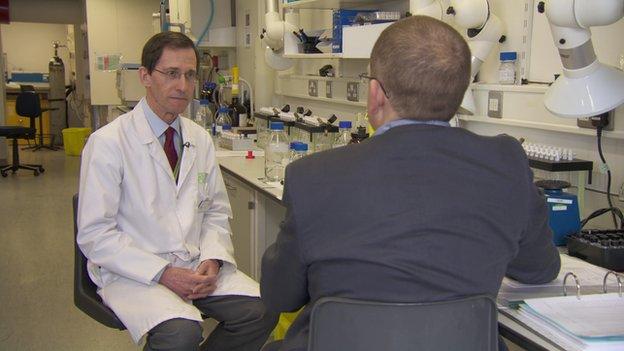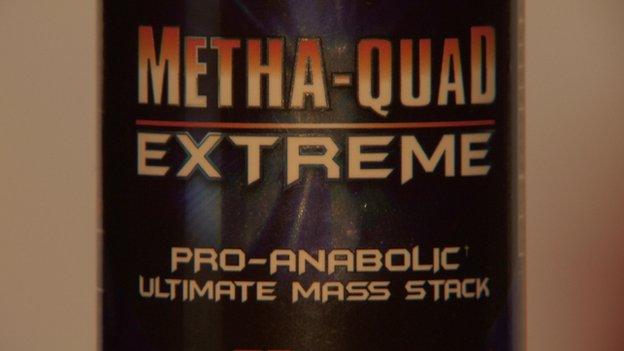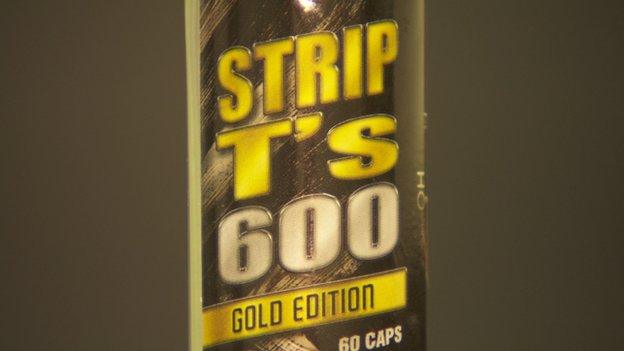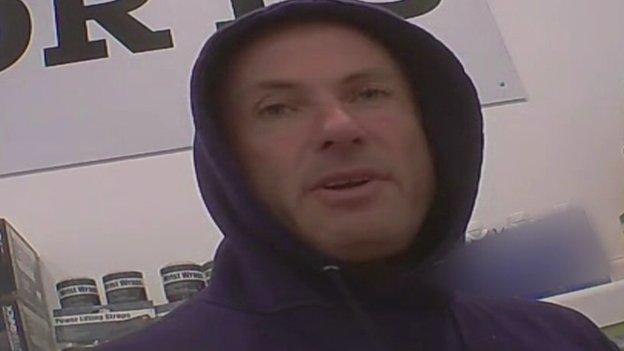Banned drugs 'sold over the counter' in sports supplements
- Published

Professor David Cowan told BBC reporter Stephen Dempster he was appalled that one particular product that has not yet been fully tested for use on man is being sold
Banned drugs, including anabolic steroids, have been found in sports supplements sold across the counter in high street shops in Northern Ireland.
The products were bought last month, during a BBC NI Spotlight investigation into the darker side of the sports industry.
The BBC went undercover in high street shops and the gym industry.
The programme set out to discover just how available banned supplements and anabolic steroids have become.
Gym goers use them - though often unwittingly - in their pursuit for the perfect body.
Six supplements were bought from sports nutrition stores in Northern Ireland and were tested by experts at King's College London.
All six contained illegal substances.
One muscle-building product, supposedly legal and called Metha-Quad Extreme, was bought at the Lisburn shop, Shapeshifter Nutrition.
It contained two anabolic steroids - Class C drugs which are illegal to sell.

Metha-Quad Extreme contained two anabolic steroids - Class C drugs which it is illegal to sell
Anabolic steroids have been linked to increased aggression, paranoia, kidney and liver damage, high blood pressure, and heart attacks.
The head of drugs control at King's College, Professor David Cowan said Metha-Quad Extreme contained a very potent mix of anabolic steroids that was "the strongest you're likely to find" for sale.
Another product in the same shop, called Ostapure, also used for muscle gain, had a substance in it that is still being researched and has never been approved for use.
Prof Cowan said: "I'm appalled that a product that has not yet been fully tested for use in man is being sold like this."
The owner of Shapeshifter Nutrition, George Dawson, claimed he did not know there were banned or potentially dangerous substances in the products. He has since removed them from his shelves.

Strip Ts contains a dangerous stimulant known as DMAA
The sports supplement industry in the UK is booming. It is worth around £350m a year.
Over the last decade, there has been an explosion in products.
Now most people who go to the gym regularly take some type of pill, potion or shake.
The majority of supplements will do no harm and some, like reputable protein shakes, are believed to aid recovery and endurance.
But an illicit market has developed and underground manufacturers are putting untested and banned stimulants into some so-called "pre-workout" supplements and fat-burners that give products an added kick.
Stimulants raise the heart rate and body temperature and can be dangerous.
So, do people always know what they are taking?
In 2012, Claire Squires died of heart failure while running the London Marathon.
She had innocently bought a supplement for endurance which she put in her water bottle.
But it later emerged that supplement contained a dangerous stimulant known as DMAA. A coroner later said DMAA contributed to her death.

Shop owner Hugh McQuade said he had now removed Strip Ts from sale
The drug is now supposed to be banned from sale in the UK.
But Spotlight purchased a product from HM Sports in east Belfast that had DMAA in it.
Owner Hugh McQuade also said he did not know the product, a fat burner called Strip T's, had DMAA in it.
Although when he sold it to an undercover reporter, he said about Strip T's: "They're banned, but they work."
In Tuesday night's programme, Spotlight catches up with Mr McQuade who says he has now removed the product from sale.
Spotlight is on BBC One Northern Ireland tonight at 22:45 BST.